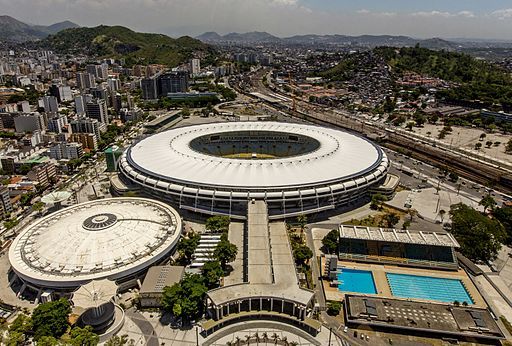How green is Brazil’s golden world cup?
The football World Cup in Brazil has been exemplary on the field, but just how successful has it been in achieving its green objectives?

The football World Cup in Brazil has been exemplary on the field, but just how successful has it been in achieving its green objectives?
For the more observant football fanatic, the most resounding green element at this year's world cup has been the 1,500 solar panels that encircle the iconic rooftop of Rio de Janeiro's Maracanã stadium. The provider of this 1MW system is Yingli Solar, who are also the event's first and only renewable sponsor.
This is not the carbon neutral company's first foray into the sports scene, however; Yingli have previously sponsored both Bayern Munich, the German Bundesliga champions, and the American Football team, the New York Jets. The unprecedented global focus given to the tournament, which includes attracting the second highest viewing figures for a sporting event in US history, has been seen as the perfect platform for promoting the solar sector.
Unfortunately, Yingli has become a shining solar beacon within an ocean of discontent when it comes to achieving the "Copa Verde" - green cup - vision. The deafening echoes of social injustice, which have cast a long shadow over the event, have been matched by the gaping sustainability gaps. Indeed, for many experts, the World Cup's green legacy will simply be one of rewriting the blueprint for other similar events in the future.
Ever since Sydney hosted the Olympics back at the turn of the millennium, there has been increased pressure for global event organisers to strive for sustainability. This has, however, almost universally fallen flat. The huge demand for infrastructure development and the large carbon footprints they have left have been the only real lasting legacy, with sustainable initiatives often considered by many as little more than lip service.
The poor performance of the Brazil World Cup has, however, been a leap backwards after at least elements of positive progression at global events over the past decade. The 2006 World Cup in Germany strived to be carbon neutral, with a variety of initiatives, including tickets that could be used on public transport, solar power at stadiums, rainwater collection and free bike parking. Both the Beijing and London Olympics were also praised for their green credentials.
That being said, this leap backwards could well end up being a jolt in the right direction for upcoming events, with the issue having now been brought to the forefront. Although Qatar, a controversial choice as host, will not be welcoming the World Cup until 2022, there have already been concerns over the ethics of their approach after a number of migrant worker deaths. Russia, the event's next hosts in 2018, have also recently hosted the Sochi Winter Olympics. Despite receiving some praise for a number of sustainable initiatives, this was largely seen as a falling short of the sustainability performance at the much lauded Vancouver Winter Games in 2010.
With all the negative attention, the major prerogative now is for FIFA - football's governing body - to establish a new standard for future events. A prime example of this has been Sweden's focus on high levels of worker protection in their bid for the 2022 Olympic Games. In addition to worker's rights, it is also crucial that anti-poverty and human rights efforts are at the centre of the standards, and carbon-neutrality has to continue being the ultimate target.
